Are you a real estate agent looking to enhance customer service and boost leads? Then, a chatbot is the perfect tool for your business.
Real estate is evolving rapidly online, and chatbots are revolutionizing people's search for their dream home.
Chatbots allow buyers and sellers to get instant answers at any time of day. They can search listings, get neighborhood details, and schedule appointments from a message.
Leading agencies use chatbots to streamline common tasks, qualify leads, and generate more business.
In this guide, we'll explore how real estate chatbots work and the key benefits they provide. We'll also break down the steps to build your own chatbot, from defining goals to integrating it into your systems.
By the end, you'll be eager to develop a chatbot to improve your customers' experience and take your business to the next level. Read on to learn how chatbots can transform your real estate success!
Let us start with knowing about real estate chatbots.
What Is a Real Estate Chatbot?
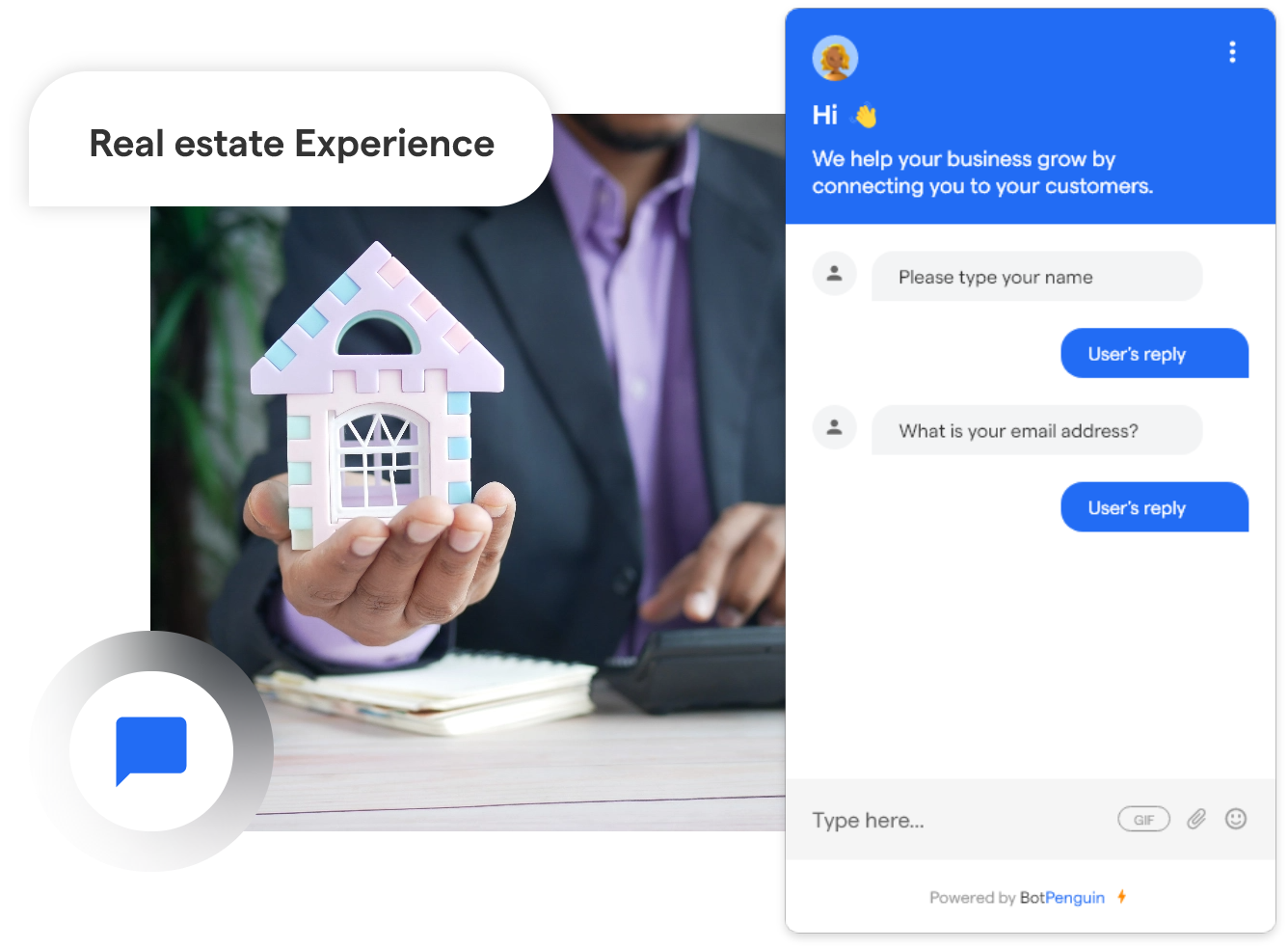
Real estate chatbots are virtual assistants that use artificial intelligence (AI) to interact with users and provide information and assistance related to real estate.
These chatbots can be accessed through messaging platforms, websites, or mobile apps, making it easier for users to get instant answers to their real estate queries.
A real estate AI chatbot is specifically designed to cater to the needs of the real estate industry.
It acts as a virtual assistant, providing information and services to potential buyers, sellers, and renters.
The chatbot can be programmed to handle a variety of tasks, such as answering frequently asked questions, providing property information, scheduling property showings, and even assisting with the mortgage application process.
Now, we will see how Real Estate Chatbots work.
Real Estate Chatbots: How They Work?
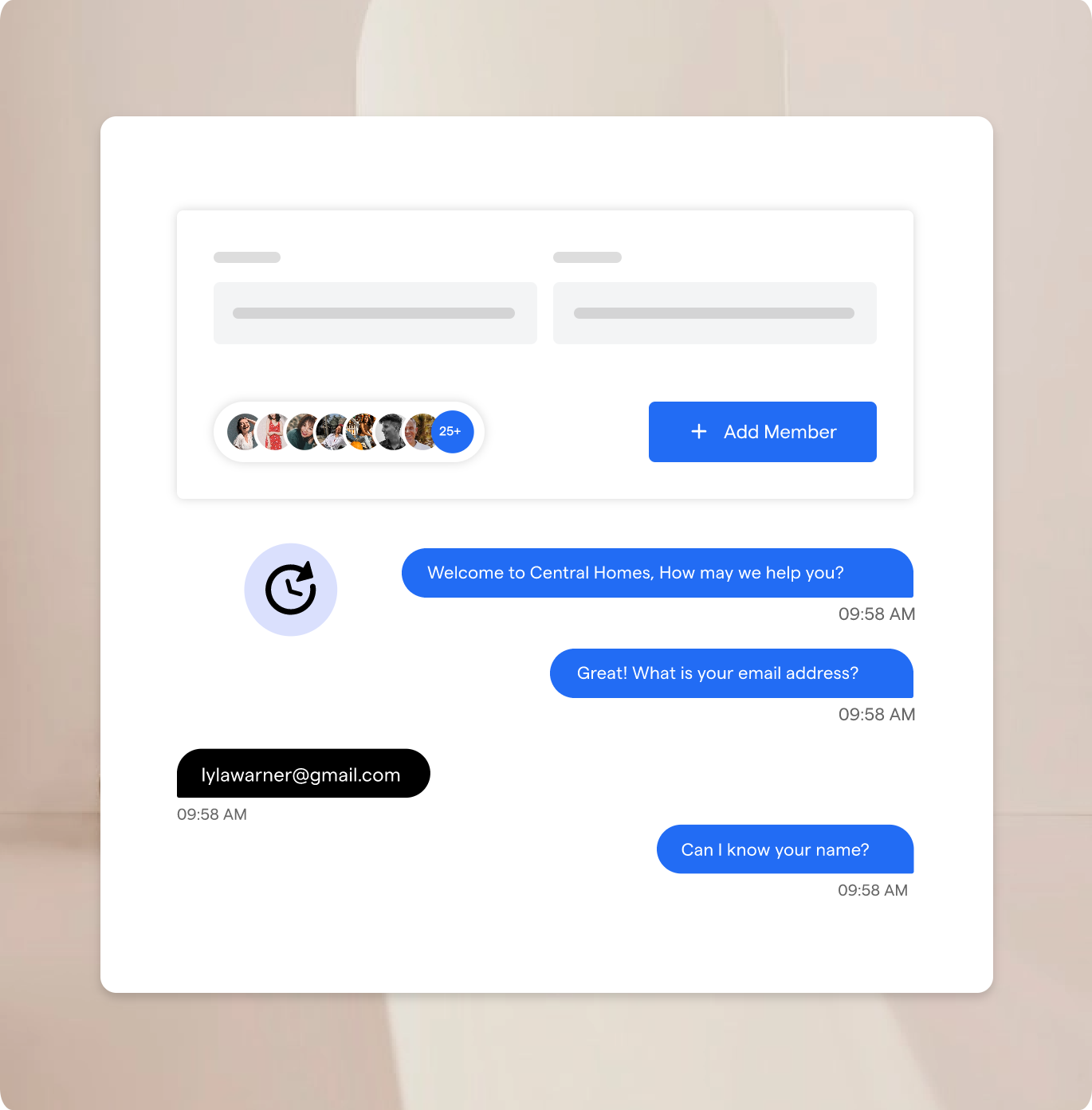
At the core of a real estate chatbot is its architecture, which determines its functions. The architecture typically consists of three main components: the user interface, the processing engine, and the knowledge base.
The user interface is the channel through which users interact with the chatbot. It can be a chat window on a website, a messaging app, or even voice-based interactions.
The processing engine is responsible for interpreting and responding to user queries. It utilizes machine learning algorithms and natural language processing (NLP) techniques to understand the user's intent and provide relevant information.
The knowledge base contains a vast amount of data related to real estate, including property listings, pricing information, neighborhood details, and other relevant insights. This knowledge base is continuously updated to ensure accurate and up-to-date information.
Key Components of a Real Estate Chatbot
To deliver the best user experience, real estate AI chatbots incorporate various key features:
- Intent recognition allows the chatbot to understand the user's intention behind a query. Using NLP algorithms, the chatbot can accurately identify whether the user wants to buy a property, rent one, or seek general information.
- Entity extraction allows the chatbot to extract specific information from user queries. For example, if a user asks about available apartments in a particular neighborhood, the chatbot can extract the entity "neighborhood" to provide more targeted responses.
- Response generation is the process by which the chatbot formulates relevant and helpful responses based on the user's query. These responses can include property descriptions, pricing details, contact information for real estate agents, and more.
Natural Language Processing (NLP) in Chatbots
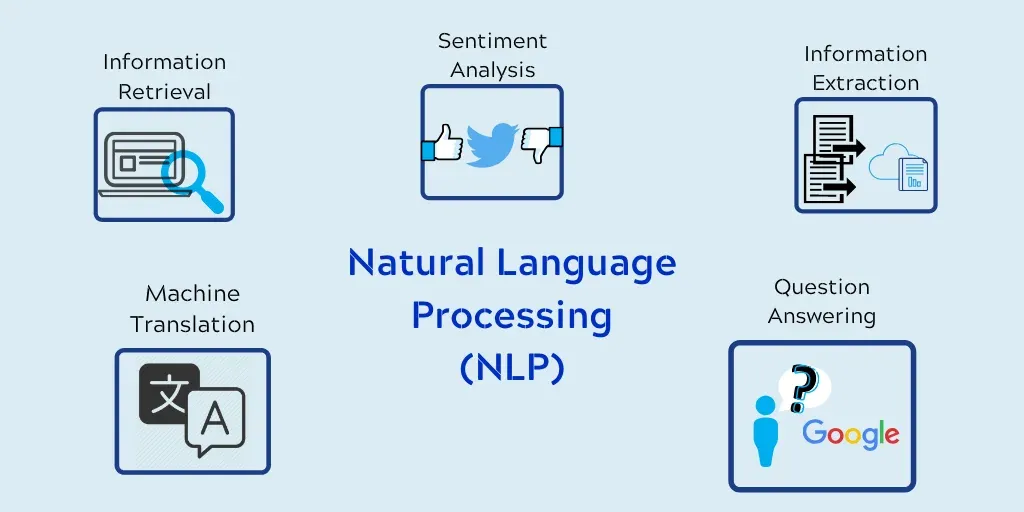
NLP is a key aspect of real estate chatbots as it enables them to understand and respond to Human language.
Here's how it works:
- Tokenization divides text into smaller units or tokens, such as words or phrases. This process helps the chatbot understand a sentence's structure and analyze it effectively.
- Semantic analysis allows the chatbot to comprehend the meaning behind a user's query. It considers the context, the relationship between words, and the overall semantics to provide accurate responses.
- Sentiment analysis enables the chatbot to gauge a user's message's sentiment or emotional tone. This helps the chatbot to customize its responses accordingly, providing empathy and understanding.
- Machine learning is employed to improve real estate chatbots' performance continuously. By analyzing user interactions and feedback, the chatbot can learn and adapt to user preferences by analyzing user interactions and feedback, enhancing its ability to provide personalized and relevant information.
After looking at the features now, we will see the benefits of Real Estate Chatbots
Suggested Reading:
Benefits of Real Estate Chatbots
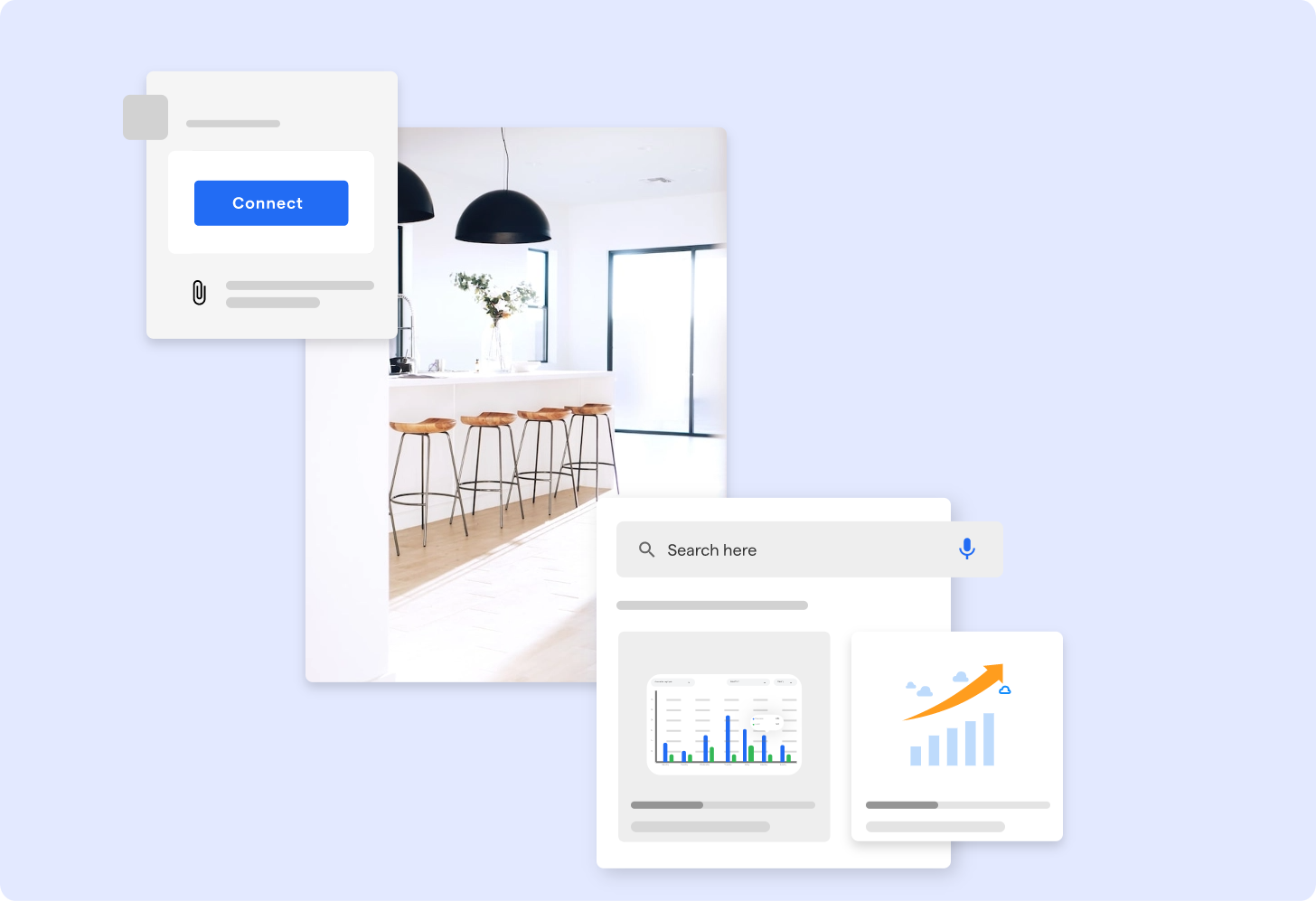
Real estate AI chatbots have gained immense popularity in recent years, and for good reason!
They offer a range of benefits that can transform how real estate professionals engage with customers, generate leads, and streamline the property search process.
This section will explore three key benefits of real estate chatbots: improved customer engagement, enhanced lead generation, and streamlined property search.
Improved Customer Engagement
Engaging with customers meaningfully is essential for any real estate professional.
Real estate chatbots excel in this area by providing users with a personalized and interactive experience.
They can greet visitors, answer questions, and guide them through the website or platform with ease.
By utilizing natural language processing and AI algorithms, chatbots can understand user intent and respond appropriately, providing valuable information and assistance.
- Instant And Accurate Information
One of the most significant advantages of using real estate chatbots is the ability to provide instant and accurate information to customers. Whether it's property details, pricing, availability, or other related queries, chatbots can quickly retrieve the information and present it to the user in a conversational manner. This eliminates the need for customers to wait for a response or navigate through multiple pages to find the information they need.
- 24/7 Availability
Another significant benefit of real estate chatbots is their round-the-clock availability. Unlike human agents who have limited working hours, chatbots are accessible 24/7. Customers can engage with the chatbot and get their queries addressed anytime, even outside regular business hours. This enhances customer satisfaction and ensures no potential leads are missed due to time constraints.
Enhanced Lead Generation
Generating quality leads is a constant challenge in the real estate industry.
Real estate AI chatbots, however, can significantly improve lead generation efforts by capturing and qualifying leads in real time.
Chatbots can identify potential leads by engaging users in conversations and collecting relevant information, and passing them on to real estate professionals for further follow-up.
- Interactive Lead Capture
Traditional lead capture forms can be lengthy and often result in potential customers abandoning the process. Real estate chatbots offer a more interactive and engaging way to capture lead information. Through conversational dialogues, chatbots can collect essential details from users, such as their budget, preferences, and contact information, making the lead capture process seamless and enjoyable.
- Lead Qualification And Nurturing
Once a lead is captured, real estate chatbots can meet prospective buyers' needs for nurturing. By asking relevant questions and understanding the needs of the prospective buyer, chatbots can provide personalized property recommendations and guide users through the buying process. This not only saves time for real estate professionals but also ensures that leads are nurtured promptly and effectively.
And, you can make the whole process more effective by using a CRM integrated Chatbot.
For example, BotPenguin a free custom chatbot development platform aces in providing CRM integrations that include popular CRM platforms like ZOHO, Hubspot, Salesforce, Insightly, and many more.
With the combined benefits of CRM and Chatbots, BotPenguin makes automation services like lead generation and customer support more effective by unifying marketing and sales efforts in one place:
- Marketing Automation
- WhatsApp Automation
- Customer Support
- Lead Generation
- Facebook Automation
- Appointment Booking
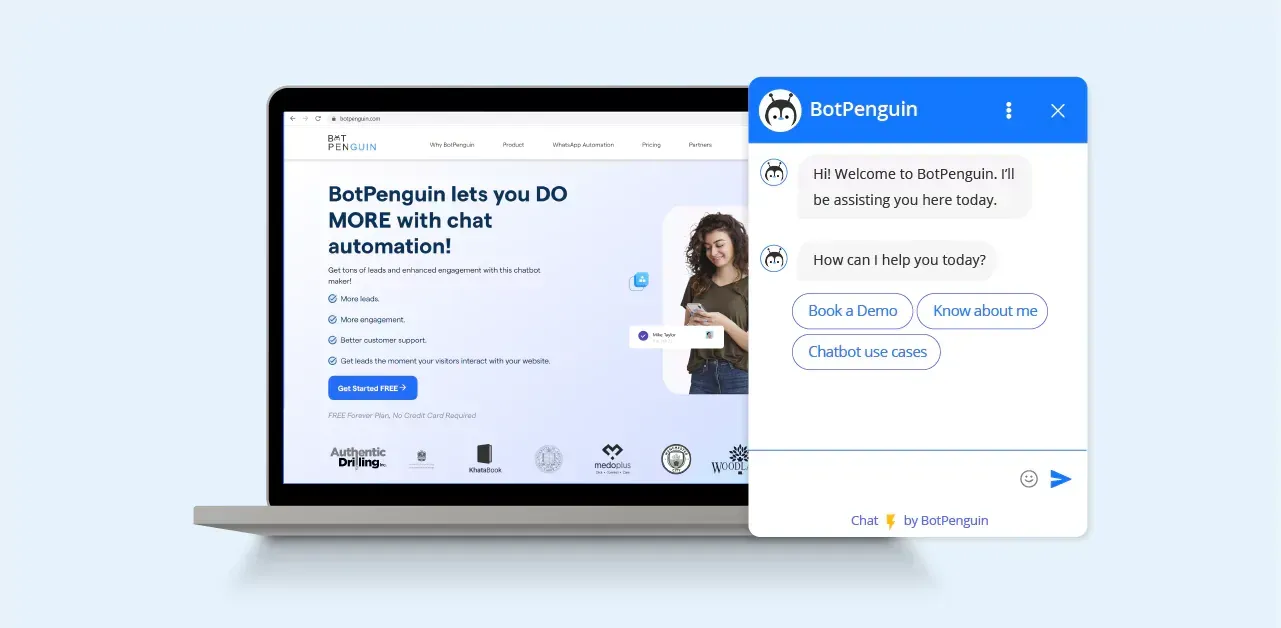
Streamlined Property Search
The process can be overwhelming, with countless listings and multiple criteria to consider. Real estate AI chatbots simplify this process and make it more efficient for users.
- Customized Property Recommendations
By analyzing user preferences and past interactions, real estate chatbots can provide customized property recommendations that match the specific needs and desires of the user. This saves customers valuable time and effort by presenting them with properties that closely align with their requirements.
- Intelligent Filtering And Sorting
Real estate chatbots can also assist users in refining their property search based on various criteria. Whether it's filtering by location, price range, amenities, or property type, chatbots can intelligently process user inputs and narrow down the search results to display the most relevant options. This ensures users are presented with properties that meet their specific requirements, making the property search process more efficient and enjoyable.
Now, we will see the use cases for Real Estate Chatbots.
Real Estate Chatbots: Use Cases
When it comes to the real estate industry, technology has been a game-changer, and chatbots are leading the way in transforming property search, management, and customer service.
In this section, we'll explore some of the most exciting use cases of real estate chatbots, showcasing their practical applications and benefits.
Chatbots for Property Search
Finding the perfect property can be daunting, but chatbots have made the process much more efficient and enjoyable for homebuyers and renters.
- Personalized Recommendations
Imagine having a friendly assistant who understands your preferences and helps your customers find their dream homes. They engage users in a conversation, asking about their desired location, budget, and specific requirements. Based on this information, the chatbot provides a curated list of properties that closely match their criteria. It's like having a real estate agent at your fingertips, available 24/7.
- Instant Information
Gone are the days of waiting for an email response or making phone calls to gather property details. With chatbots, users can instantly access information about listings. Whether you want to know the number of bedrooms, check for pet-friendly options, or inquire about available amenities, simply ask the chatbot and receive an instant response. It's quick, convenient, and hassle-free.
Chatbots for Property Management
Managing properties can be complex, but chatbots simplify the process for landlords, property managers, and tenants alike.
- Maintenance Requests
Say goodbye to lengthy phone calls and emails for reporting maintenance issues. Property management chatbots like Mynd have revolutionized how tenants communicate with their landlords. Tenants can now use a chatbot to report problems, schedule repairs, and track the progress of their requests. The chatbot generates work orders, updates tenants on repair status, and keeps them in the loop throughout the process.
- Rent Payments
Traditionally, paying rent involved writing checks or making bank transfers. However, chatbots like the one used by Mynd allow tenants to pay rent conveniently through the chatbot interface. This saves time and effort, providing a seamless experience for both tenants and landlords.
Chatbots for Customer Service
Providing exceptional customer service is crucial in the real estate industry, and chatbots are making it easier and more efficient than ever before.
- Instant Support
Real estate chatbots, like the one used by Compass, offer immediate assistance to website visitors. Whether users have questions about available listings, want market insights, or need help connecting with a real estate agent, the chatbot provides timely and personalized support. It's like having a knowledgeable friend who is always ready to help.
- Apartment Recommendations
Searching for an apartment can be overwhelming, especially in a bustling city. Apartment List utilizes a chatbot to make the process easier for users. The chatbot engages in a conversation, allowing users to specify their desired location, budget, and apartment requirements. Based on these inputs, the chatbot provides a list of available apartments, complete with information on amenities, pricing, and leasing terms. It's like having a virtual apartment finder to make your search stress-free.
In the next section, we will see how to build your own Real Estate Chatbots.
Suggested Reading:
Building Your Own Real Estate Chatbot
Before jumping into the process of building a chatbot for your real estate business, there are a few important factors to consider:
- Target Audience: Understand who your chatbot will be interacting with. Are they homebuyers, renters, or property investors? Knowing your audience will help you design a chatbot that meets their needs and preferences.
- Goals and Objectives: Determine what you want your chatbot to achieve. Is it to provide property recommendations, answer frequently asked questions, or assist with property management tasks? Having a clear set of goals will guide the development process.
- Available Resources: Consider the resources you have available for chatbot development. Do you have an in-house team for programming and design, or will you need to outsource? Assessing your resources will help you determine whether to build the chatbot internally or seek external assistance.
Steps to Building a Chatbot
Now, let's dive into the steps involved in building your own real estate chatbot:
- Define Use Cases: Identify the specific use cases and scenarios in which your chatbot will be used. For example, property search, appointment scheduling, or customer support. This will help you outline the functionality and features required for your chatbot.
- Choose a Platform: Select a chatbot development platform that suits your needs and technical capabilities. Some popular options include BotPenguin, Dialogflow, etc. These platforms provide user-friendly interfaces and offer various integrations to enhance your chatbot's functionality.
- Design Conversation Flow: Map out the conversation flow for your chatbot. Think about the different paths a conversation could take and design responses accordingly. Keep the dialogue natural and user-friendly, avoiding complex language or jargon.

- Develop and Train: Start building your chatbot by creating the necessary conversational triggers, intents, and responses. Begin with the most common user queries and gradually expand the chatbot's knowledge base. Train the chatbot using real-life examples to improve accuracy and understanding.
- Test, Iterate, and Evaluate: Test your chatbot extensively to ensure it functions smoothly and provides accurate responses. Gather feedback from users and iterate on the chatbot's design and functionality. Regularly evaluate its performance and make necessary improvements.
Costs Involved in Developing a Chatbot
Building a chatbot for real estate involves some costs that you need to be aware of:
- Development Costs: The development costs depend on whether you build the chatbot internally or hire a development team. The costs might be lower if you have the skills and resources available in-house. However, if you choose to outsource, factors such as complexity, features, and the development team's rates will impact the costs.
- Maintenance and Updates: Once the chatbot is live, there will be ongoing maintenance and update costs. This includes regular bug fixes, performance optimization, and adding new features or functionalities to keep the chatbot current.
- Integration Costs: If you plan to integrate the chatbot with other systems like CRM or property management platforms, additional integration costs may be involved. These costs vary based on the complexity of the integration and the systems involved.
We at BotPenguin offer the best real estate chatbot that boosts your business; let’s see how.
Boosting Your Business with BotPenguin’s Real Estate Chatbot
Boost your real estate business with BotPenguin's powerful yet easy-to-use Real Estate Chatbot.
Whether you're a small independent agent or a large brokerage, our chatbot can automate routine tasks, answer common buyer and seller questions, and even help qualify leads around the clock.
Through seamless integrations with Messenger, WhatsApp, and more, our Real Estate Chatbot lets you engage customers on their preferred channels.
It can recommend properties based on criteria, schedule viewings, and automate follow-ups. Best of all, no coding is required.
Using BotPenguin, you can create and customize your intelligent chatbot in just a few clicks. Empower your business with a marketing tool that streamlines operations and improves the home search experience.
Give your customers a convenient way to get instant assistance anytime while freeing up your time for high-level tasks. Start boosting leads and sales today with BotPenguin's feature-rich Real Estate Chatbot.
Conclusion
Take your real estate business to the next level with an AI assistant that works 24/7. BotPenguin makes it easy and affordable for any agent or brokerage to create a powerful real estate chatbot without technical skills.
Our chatbots are fully customizable, so you can provide instant support to buyers and sellers on sites and apps. Set up automatic responses to common questions and use natural language to qualify leads.
You can integrate your BotPenguin chatbot with platforms like Facebook and WhatsApp to engage customers wherever they are. Best of all, it's simple to manage - just log in and drag and drop to make updates.
Close the best real estate deals with BotPenguin’s AI chatbot which works for you around the clock.
Try it out risk-free today. You'll be amazed by how much a chatbot can boost your business!
Suggested Reading:
Frequently Asked Questions (FAQs)
Is there any chatbot for the real estate industry?
Yes, there are numerous chatbots designed specifically for real estate. These bots assist in customer inquiries, property searches, scheduling viewings, and providing information about listings, enhancing customer engagement and easing the workload for agents.
How is AI used in the real estate industry?
AI is utilized in real estate for various tasks like predictive analytics for property valuation, personalized recommendations for buyers, automated communication through chatbots, and data analysis for market trends. It optimizes processes, aiding in decision-making and customer interactions.
What form of AI is most commonly used in real estate?
Machine learning algorithms are commonly employed in real estate ai chatbot. These algorithms analyze large datasets to predict property prices, understand buyer preferences, and optimize property recommendations. Natural language processing (NLP) is also popular for chatbots, enabling human-like interactions.
How can real estate professionals integrate chatbots into their websites or platforms?
Integrating real estate ai chatbot involves selecting suitable platforms or tools, customizing chatbot workflows, and embedding them into websites or applications. Many platforms offer easy-to-use interfaces for seamless integration.
What are the key features and functionalities of effective real estate chatbots?
Effective chatbots possess features like natural language processing, property search capabilities, personalized recommendations, appointment scheduling, and integration with CRM systems for lead management.


